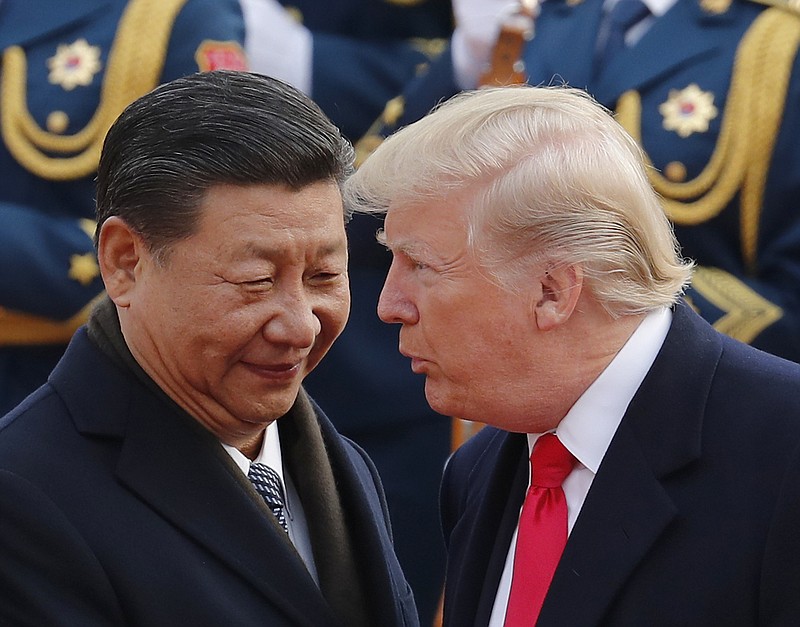There is a saying - "When you don't know where you're going, any road will get you there" - and it perfectly sums up the contrast between China's President Xi Jinping and President Donald Trump.
Xi has been brilliant at playing Trump, plying him with flattery and short-term trade concessions and deflecting him from the real structural trade imbalances with China. All along, Xi keeps his eye on the long-term prize of making China great again. Trump, meanwhile, touts every minor victory as historic and proceeds down any road that will give him a quick sugar high.
Trump literally has no idea what he's doing and has no integrated strategy - because, unlike Xi, Trump's given no thought to the big questions every effective leader starts his day with: "What world am I living in? What are the biggest trends in this world? And how do I align my country so more of my citizens get the most out of these trends and cushion the worst?"
What world are we in? One in which we're going through three "climate changes" at once.
We're going through a change in the actual climate: Destructive weather events and the degradation of ecosystems are steadily accelerating.
We're going through a change in the "climate" of globalization: from an interconnected world to an interdependent one; from a world of walls, where you build your wealth by hoarding resources, to a world of webs, where you thrive by connecting your citizens to the most flows of ideas, trade, innovation and education.
And, finally, we're going through a change in the "climate" of technology and work: Machines are acquiring all five senses, and with big data and artificial intelligence, every company can now analyze, optimize, prophesize, customize, digitize and automatize more and more jobs, products and services.
So how's China responding? To deal with the change in the climate, it's massively investing in clean power and electric vehicles - because its own people won't be able to breathe otherwise and because it knows that in a world that will add another 1 billion people by around 2030, clean power and transportation and energy efficiency will be the next great global industry, or nobody anywhere will breathe.
In response to a more interdependent world, China is deepening its trade ties to all the fast-growing Asian markets around it through its "One Belt, One Road" project and its Asian Development Bank, while tightly controlling its own market. I call it "globalization for me but not for you."
Because while China hails globalization, it imposes a 25 percent tariff on imported cars (while America imposes only 2.5 percent) and 50-50 joint ventures and technology transfers for big companies that want to gain access to China's giant market. But China gets away with it.
In technology, China has embarked on a plan called "Made in China 2025" that's plowing government funds and research into commercializing 10 strategic industries while creating regulations and swiping intellectual property from abroad to make them all grow faster. These industries include electric vehicles, new materials, artificial intelligence, integrated circuits, biopharmacy, quantum computing, 5G mobile communications and robotics.
And Trump? On the change in the climate, he's promoting coal over clean energy, and has appointed climate-change deniers to all of his key environmental posts.
On globalization, Trump tore up the Trans-Pacific Partnership (TPP) deal, which would have put him at the helm of a 12-nation Pacific trading bloc (without China), built on U.S. interests and values, and would have eliminated as many as 18,000 tariffs on U.S. exports to countries that, together with the U.S., control 40 percent of global GDP.
On the change of the climate of technology, Trump is pushing a tax bill that is based on no analysis of emerging technologies and how we might reform our tax laws to incentivize more investment in them. Actually, the bill would eliminate the $7,500 tax credit for electric cars; shrink the tax credits vital for enabling wind projects; and impose a tax on the endowments of our wealthiest colleges - i.e., our science and engineering treasures - endowments that colleges use to fund research and extend scholarships for the neediest students.
China, with its ability to focus, is getting 90 percent out of its inferior system, and it has brought China a long way fast. And we, with too little focus, are getting 50 percent out of our superior system. If that persists, it will impact the balance of power.
Now you know why the Chinese were so happy to throw a bash for Trump in Beijing.
The New York Times
